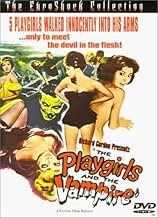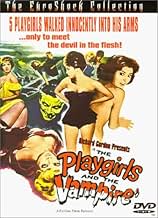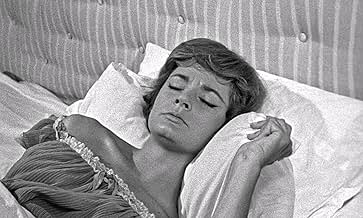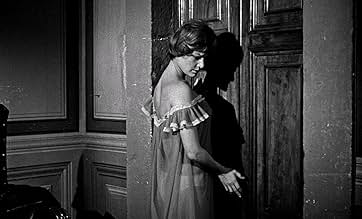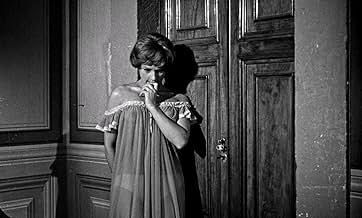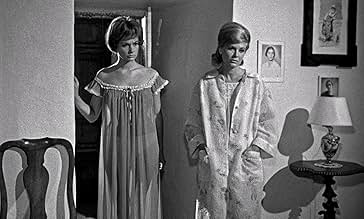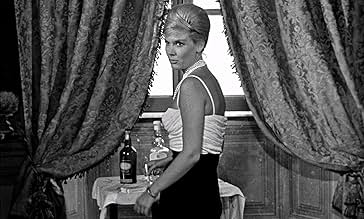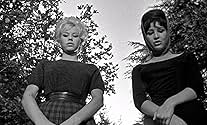IMDb RATING
5.1/10
692
YOUR RATING
Five beautiful showgirls are trapped by a storm and find refuge in a creepy old castle. The owner of the castle, a strange nobleman, has a secret laboratory in the basement and has his own p... Read allFive beautiful showgirls are trapped by a storm and find refuge in a creepy old castle. The owner of the castle, a strange nobleman, has a secret laboratory in the basement and has his own plans for the girls.Five beautiful showgirls are trapped by a storm and find refuge in a creepy old castle. The owner of the castle, a strange nobleman, has a secret laboratory in the basement and has his own plans for the girls.
Featured reviews
As was often the case with European horror movies from the 1960's and 1970's this film had many titles but I watched it on DVD as "The Playgirls and the Vampire". Five very attractive showgirls, their annoying manager and driver seek refuge at a castle during a night storm, but as so often happens the old building is resident to a centuries old vampire. And sadly he isn't a very good one, his ultimate demise is rather disappointing too. Hammer were doing this so much better, this is just a cheap imitation. I watched the English language version and the bad dubbing didn't help. On the plus side the five Playgirls are very attractive, we are treated to several scenes in which they are either scantily dressed or in perhaps the film's most notable moment naked. This movie apparently features the first nude on-screen female vampire, we see her breasts though not full frontal. A staking has blood running down her bare leg, quite strong for 1960. The theatrical trailer states for "Adults only" but decades on this is very tame stuff, only recommended for fans of Italian horror.
Five female dancers, their manager and their bus driver travel around Europe performing in one venue after another while barely making ends meet. One night after a storm blocks the main road, they take a secondary route which leads to a castle belonging to "Count Gabor Kernassy" (Walter Brandi). They are warned to turn around but are reluctant to do so because the manager "Lucas" (Alfredo Rizzo) didn't pay the hotel bill the night before. So the Count puts them up for the night but gives them a strict warning that they are not to leave their bedrooms during the night. Unfortunately, one curious dancer named "Katia" (Maria Giovannini) becomes too curious and dies from an apparent fall from the castle. Things only begin to get even more curious after that. That said, rather than divulge the mysteries that remain I will just say that this is a film more noted for the attractive dancers than anything else. And while Maria Giovannini was certainly sexy, I thought Lyla Rocco (as "Vera") was prettier still. But other than the appearance of the attractive ladies, I thought the film was slow-moving and dull at times. Still, it wasn't a bad vampire film and it's worth a look for those who enjoy movies of this kind from the early 60's.
PLAYGIRLS AND THE VAMPIRE is a so-so early Italian horror movie that is good enough to hold an average euro-horror film buffs attention. Nice music, great looking (and occasionally, scantilly clad) go-go dancers, and not to mention an oddly unique final death scene.
Overall, a nice addition to any obscure movie collection, that will probably merit more than one viewing.
Overall, a nice addition to any obscure movie collection, that will probably merit more than one viewing.
Ragnoli's film focuses on the travails of a group of five dance hall girls and their manager who, after defaulting on a hotel bill, find themselves bumping through unfamiliar countryside at night looking for late accommodation. Ignoring the warnings of a local, they continue along a side road to the castle of a mysterious Count Kernassy (Walter Brandi), where one of the girls, Vera experiences strong feelings of déjà vu. At first treated with coldness, it soon appears that the beautiful-yet-mopey Vera bears a startling resemblance to one of Count Kernassy's ancestors, Margherita. Ominously, the Count has an infatuation with this long-dead beauty. As sudden storms wash out bridges behind them, the troupe are obliged to spend more than one night at the castle and, despite warnings, venture out of the their rooms at night...
A minor camp item with some historical interest today, The Playgirls And The Vampire first saw light of day on the continent as L'ultima preda del vampiro (trans: The Vampire's Final Prey), an Italian attempt to capitalise on the vogue for the contemporary Hammer product with a suitably spiced-up Euro version. Adding lashings of female titillation in a way which was unthinkable to the Anglo Saxon market (the film includes a brief topless shot), director Piero Ragnoli made up a package which was both more lascivious than that produced by the studio at Bray, and one to which critical opinion has been less kind. Predictably, the heady cocktail was a commercial success at the time, and some commentators have since seen the results as anticipating the sexy vampire cinema of Jean Rollin a few years later, although the sheen of erotic sophistication brought by the French auteur is conspicuously missing here. American producer Richard Gordon, sensing money from the exploitation market, promptly picked up the English language rights to the original film, did a rush-dubbing job and re-titled it with an eye on maximum marquee appeal. (He also prepared a cut print for those areas in which censorship was more squeamish, under the title of Curse Of The Vampire - a version that by all accounts approached the incoherent).
While the beginning of this version of the film, which features a long tracking shot from a dungeon window to a stone sarcophagus and an emerging, spidery hand, momentarily recalls some of the splendours of such films as Bava's Mask Of The Demon (aka: La Maschera del demonio, 1960), such atmospherics are rarely repeated. The most effective moment occurs during the big burial scene later, where Aldo Greci's camera performs a 360-degree pan around the faces of the mourners from a low angle. Here the combination of a daring, continuous shot, allied with the distortions of a wide-angle lens produces the sense of dread a film like this so badly needs. Elsewhere the cinematography is more careless, with at least one scene suffering from a distracting focus problem, and the sparse interiors of the Count's castle being lit without subtlety. Unfortunately, the plot hardly distracts one from such shortcomings. Containing more holes than a ghoul's winding sheet, in execution it only emphases that for the most part Ragnoli's technical competence is mediocre. Given the electric possibilities which exist when sex and horror are combined, his film rarely aspires to the erotic, even though the glamorous playgirls are frequently to be seen wandering through chilly grounds and corridors, clad in nothing but their nighties.
What makes the film enjoyable is the passing campness of it all, the ineptness of the characters and the ludicrousness of some of the dialogue. The girls form part of a truly terrible dance troupe: when, after a tragedy, they gather to lose themselves in a rehearsal ("the girls have been very upset, and this is the only way to make them stop worrying about it" we are assured) and one performs a striptease, their lack of professionalism and poise in ensemble is laughable. Their manager, Lucas, (Alfredo Rizzo) is a crabby, cynical showman who is at least a more believable stereotype than the dull vampire fodder he escorts. In one of the more amusing moments of the film, we see him snuggling down in his room with a girlie magazine before being confronted by a nude, newly dead girl. Here his mugging is entertaining and the often self-conscious dialogue, which is a feature of the film, doesn't intrude. Elsewhere the non-sequiturs can be amazing ("I just don't understand it"/ "What don't you understand?"/ "Nothing, nothing at all" is one worthy of Ed Wood). As various mysterious events unfold, such conversations contribute to an atmosphere that can be just as bewildering to the audience as to the principals. Supporting characters, such as the groundskeeper, the limping Zoltan (probably Antoine Nicos), and the housekeeper (Marisa Quattrini) remain woefully undeveloped which given the nature of the genre, where every servant is a satanic stooge it seems, is surprising. One especially regrets the waste of the housekeeper. A demonic Mrs Danvers would have been a useful bonus in taking up some of the dramatic slack.
As "one of the first horror films from any country to mix Gothic horror and explicit eroticism," the film is a slight genre landmark. Perhaps a director with a greater sense of visual style would have made more of the opportunity, but the result is still watchable, if a little slow. For those who enjoy continental horror from this time - the start of a classic production period, which until recently has been hard to see - this is worth seeking out, if not essential viewing.
A minor camp item with some historical interest today, The Playgirls And The Vampire first saw light of day on the continent as L'ultima preda del vampiro (trans: The Vampire's Final Prey), an Italian attempt to capitalise on the vogue for the contemporary Hammer product with a suitably spiced-up Euro version. Adding lashings of female titillation in a way which was unthinkable to the Anglo Saxon market (the film includes a brief topless shot), director Piero Ragnoli made up a package which was both more lascivious than that produced by the studio at Bray, and one to which critical opinion has been less kind. Predictably, the heady cocktail was a commercial success at the time, and some commentators have since seen the results as anticipating the sexy vampire cinema of Jean Rollin a few years later, although the sheen of erotic sophistication brought by the French auteur is conspicuously missing here. American producer Richard Gordon, sensing money from the exploitation market, promptly picked up the English language rights to the original film, did a rush-dubbing job and re-titled it with an eye on maximum marquee appeal. (He also prepared a cut print for those areas in which censorship was more squeamish, under the title of Curse Of The Vampire - a version that by all accounts approached the incoherent).
While the beginning of this version of the film, which features a long tracking shot from a dungeon window to a stone sarcophagus and an emerging, spidery hand, momentarily recalls some of the splendours of such films as Bava's Mask Of The Demon (aka: La Maschera del demonio, 1960), such atmospherics are rarely repeated. The most effective moment occurs during the big burial scene later, where Aldo Greci's camera performs a 360-degree pan around the faces of the mourners from a low angle. Here the combination of a daring, continuous shot, allied with the distortions of a wide-angle lens produces the sense of dread a film like this so badly needs. Elsewhere the cinematography is more careless, with at least one scene suffering from a distracting focus problem, and the sparse interiors of the Count's castle being lit without subtlety. Unfortunately, the plot hardly distracts one from such shortcomings. Containing more holes than a ghoul's winding sheet, in execution it only emphases that for the most part Ragnoli's technical competence is mediocre. Given the electric possibilities which exist when sex and horror are combined, his film rarely aspires to the erotic, even though the glamorous playgirls are frequently to be seen wandering through chilly grounds and corridors, clad in nothing but their nighties.
What makes the film enjoyable is the passing campness of it all, the ineptness of the characters and the ludicrousness of some of the dialogue. The girls form part of a truly terrible dance troupe: when, after a tragedy, they gather to lose themselves in a rehearsal ("the girls have been very upset, and this is the only way to make them stop worrying about it" we are assured) and one performs a striptease, their lack of professionalism and poise in ensemble is laughable. Their manager, Lucas, (Alfredo Rizzo) is a crabby, cynical showman who is at least a more believable stereotype than the dull vampire fodder he escorts. In one of the more amusing moments of the film, we see him snuggling down in his room with a girlie magazine before being confronted by a nude, newly dead girl. Here his mugging is entertaining and the often self-conscious dialogue, which is a feature of the film, doesn't intrude. Elsewhere the non-sequiturs can be amazing ("I just don't understand it"/ "What don't you understand?"/ "Nothing, nothing at all" is one worthy of Ed Wood). As various mysterious events unfold, such conversations contribute to an atmosphere that can be just as bewildering to the audience as to the principals. Supporting characters, such as the groundskeeper, the limping Zoltan (probably Antoine Nicos), and the housekeeper (Marisa Quattrini) remain woefully undeveloped which given the nature of the genre, where every servant is a satanic stooge it seems, is surprising. One especially regrets the waste of the housekeeper. A demonic Mrs Danvers would have been a useful bonus in taking up some of the dramatic slack.
As "one of the first horror films from any country to mix Gothic horror and explicit eroticism," the film is a slight genre landmark. Perhaps a director with a greater sense of visual style would have made more of the opportunity, but the result is still watchable, if a little slow. For those who enjoy continental horror from this time - the start of a classic production period, which until recently has been hard to see - this is worth seeking out, if not essential viewing.
You are lost on a lonely Italian road. A storm is coming up. There is no motel around. You spot a castle. Stay away, you dolt! Sleep in the car. Do not enter the creepy castle.
Alas, our group does not heed the warning and end up in a castle. The owner, Count Gabor Kernassy (Walter Brandi), tries to shoo them away, but there seems to be a connection with one named Vera (Lila Rocco). She even knows where the smokes are kept, even though she has never been there.
Despite warnings, one of the girls (Maria Giovannini) goes wandering and surprise, she's found dead the next day. I guess the story would have ended too soon if they all obeyed the Count.
There was not a lot of blood in this early Italian classic, and there was only a brief flash of nudity. The girls did, however, do a lot of running around in their see-through nighties. I always though castles were cold and damp. I guess this one had central heat.
For true vampire aficionados only.
Alas, our group does not heed the warning and end up in a castle. The owner, Count Gabor Kernassy (Walter Brandi), tries to shoo them away, but there seems to be a connection with one named Vera (Lila Rocco). She even knows where the smokes are kept, even though she has never been there.
Despite warnings, one of the girls (Maria Giovannini) goes wandering and surprise, she's found dead the next day. I guess the story would have ended too soon if they all obeyed the Count.
There was not a lot of blood in this early Italian classic, and there was only a brief flash of nudity. The girls did, however, do a lot of running around in their see-through nighties. I always though castles were cold and damp. I guess this one had central heat.
For true vampire aficionados only.
Did you know
- TriviaMaria Giovannini's Katia is the first depiction of a nude vampire on screen; years before erotic/horror directors Jean Rollin and Jess Franco, and Hammer Studios made seductive naked women with fangs a staple of the genre.
- ConnectionsEdited into FrightMare Theater: Playgirls and the Vampire (2017)
- How long is The Playgirls and the Vampire?Powered by Alexa
Details
- Release date
- Country of origin
- Language
- Also known as
- The Playgirls and the Vampire
- Filming locations
- Palazzo Borghese, Artena, Rome, Lazio, Italy(interiors)
- Production company
- See more company credits at IMDbPro
- Runtime1 hour 23 minutes
- Color
- Sound mix
- Aspect ratio
- 1.37 : 1
Contribute to this page
Suggest an edit or add missing content

